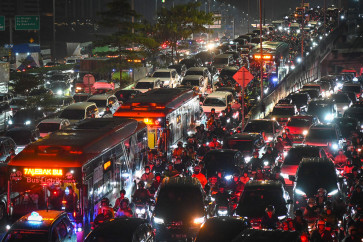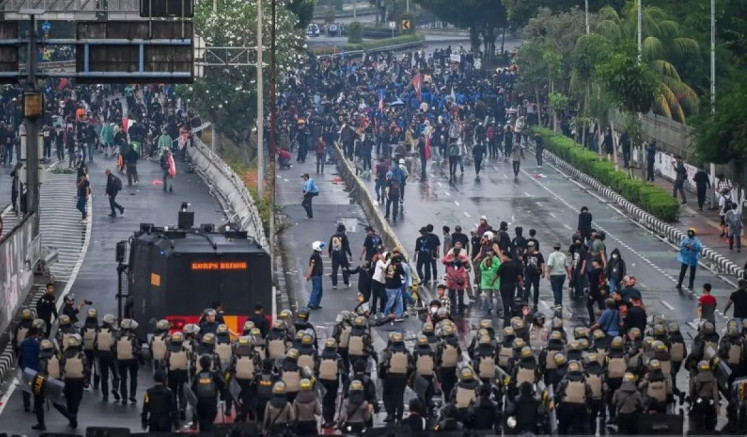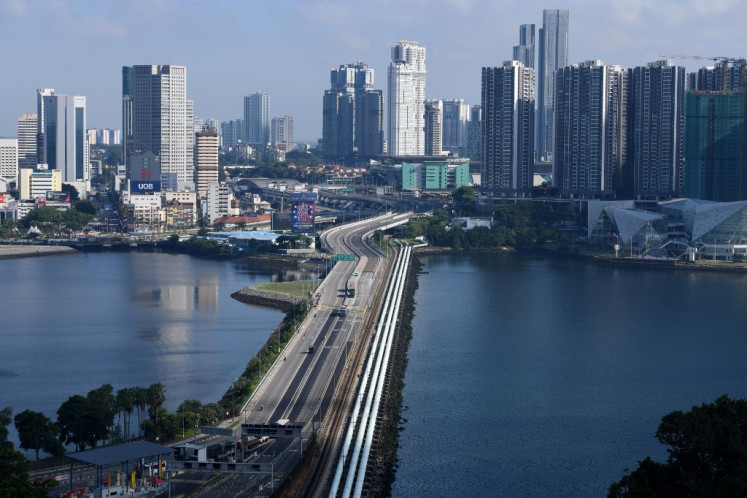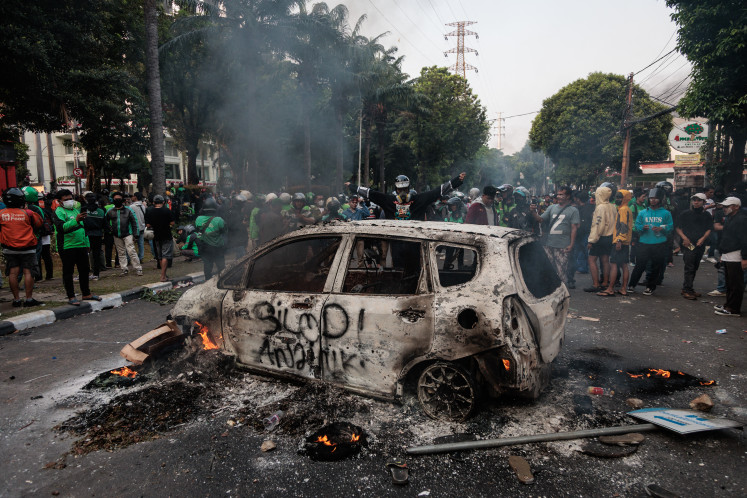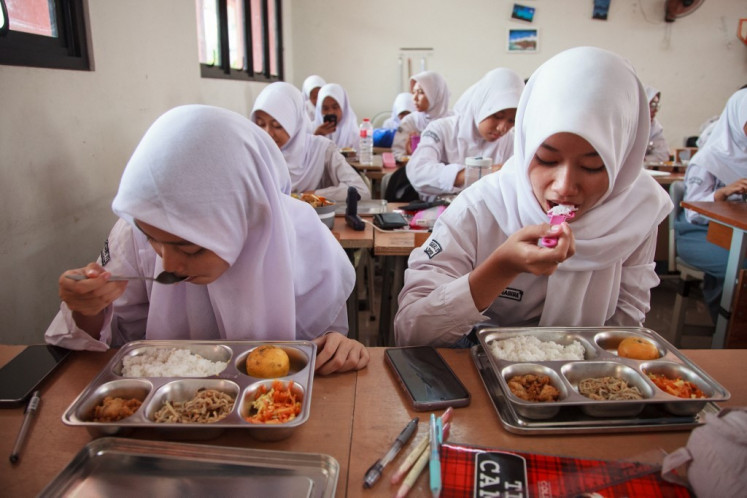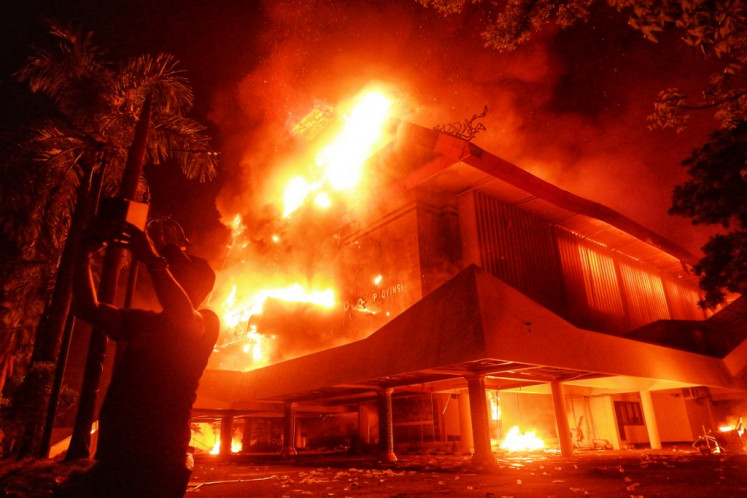Popular Reads
Top Results
Can't find what you're looking for?
View all search resultsPopular Reads
Top Results
Can't find what you're looking for?
View all search resultsGeneva Conventions at 76: Pushing back against erosion of humanity
Today’s crisis is not born of a lack of rules, but a lack of will to enforce them and to hold violators accountable.
Change text size
Gift Premium Articles
to Anyone
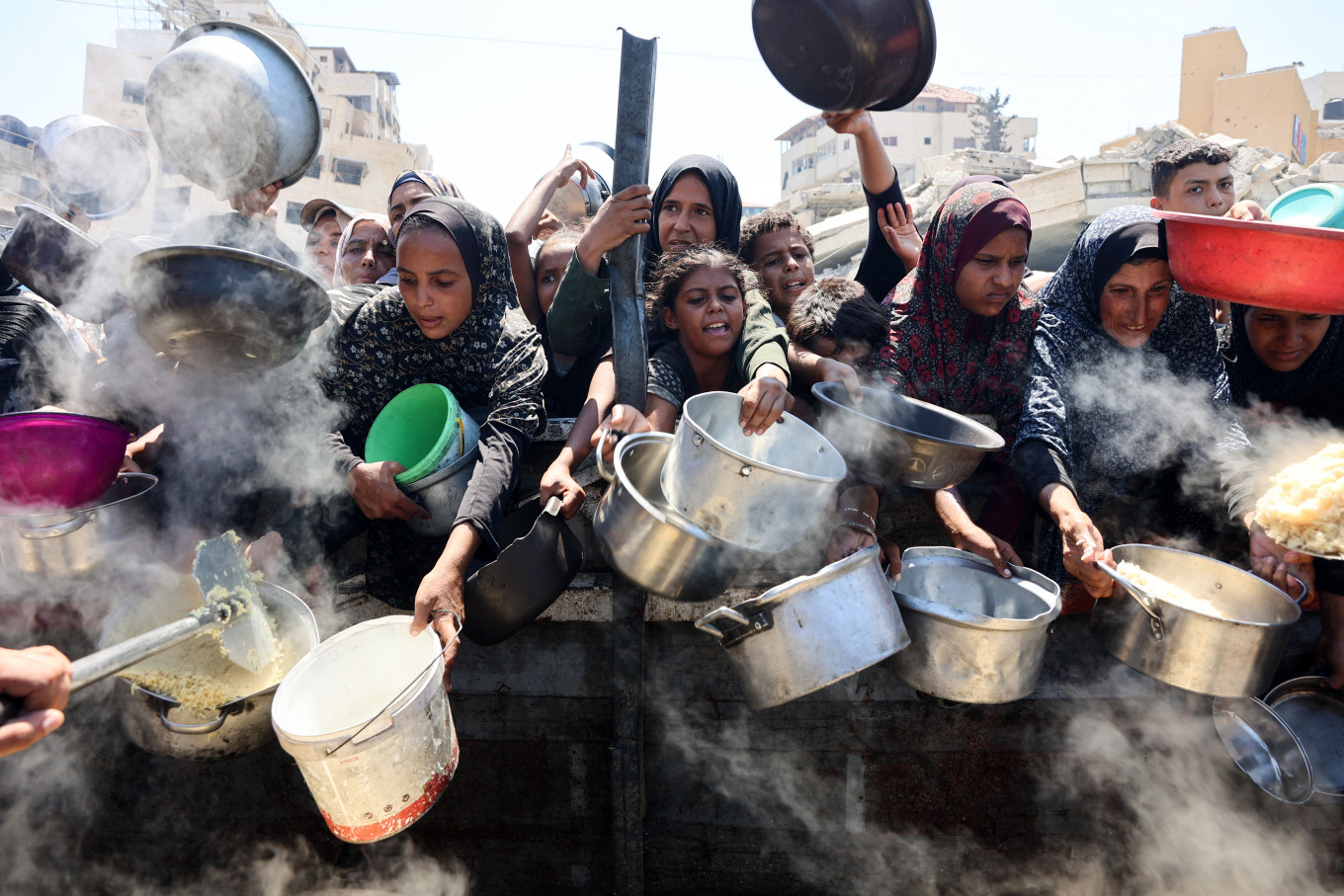 Palestinian women and girls elbow their way to receive cooked rice from a charity kitchen in Gaza City on Aug. 23, 2025. The United Nations officially declared a famine in Gaza on Aug. 22, blaming “systematic obstruction“ of aid by Israel during more than 22 months of war, with Prime Minister Benjamin Netanyahu swiftly dismissing the findings. (AFP/Omar Al-Qattaa)
Palestinian women and girls elbow their way to receive cooked rice from a charity kitchen in Gaza City on Aug. 23, 2025. The United Nations officially declared a famine in Gaza on Aug. 22, blaming “systematic obstruction“ of aid by Israel during more than 22 months of war, with Prime Minister Benjamin Netanyahu swiftly dismissing the findings. (AFP/Omar Al-Qattaa)
T
he world marked the 76th anniversary of the Geneva Conventions, the cornerstone of international humanitarian law (IHL), on Aug. 12. Forged in the aftermath of World War II, these treaties were born out of devastation and despair, yet anchored in a simple conviction: Even wars have rules.
Unlike many treaties that may feel distant from everyday life, the Geneva Conventions carry immediate and concrete consequences in times of war. Their observance often means an instant difference between life and death for civilians caught in the war.
Today, all 193 members of the United Nations are bound by the conventions, a rare feat of universality in global politics. Yet their universality masks a grim reality. According to the International Committee of the Red Cross (ICRC), at least 120 armed conflicts rage across the world today. And in too many of them, blatant and systemic disregard for the Geneva Conventions has resulted in immense suffering and staggering civilian casualties.
Gaza stands as the starkest example. Since Oct. 7, 2023, more than 61,000 Palestinians, including over 18,000 children, have been killed; adding to the hundreds of thousands lost since the occupation began decades ago.
Hospitals and humanitarian facilities lie in ruins, starvation has been weaponized, aid convoys blocked, and nearly 2 million people displaced. In this context, Indonesia has been among the most active countries advocating for a Conference of the High Contracting Parties to the Geneva Conventions.
Equally alarming is the deliberate targeting of humanitarian workers who provide relief and journalists who expose atrocities. According to the UN Office for the Coordination of Humanitarian Affairs (OCHA), the year 2024 marked the deadliest year on record for humanitarian workers, with 383 killed, more than half of them in Gaza alone.
These are not just numbers. Behind each one is a life cut short, a family broken and a community uprooted. They also expose a deeper failure of the international system, when treaties designed to protect lives and ratified by all states are violated daily.
Amid the weakening of multilateralism, undermined by populist nationalism, double standards and the waning trust in global institutions, some states are refusing to stand idle. Indonesia is among them. A vibrant democracy with a strong humanitarian tradition, a rising middle power and a bridge between the Global North and South, Indonesia has stepped forward to reassert IHL on the global agenda.
Indonesia took a further concrete step by joining the “Global Initiative to Galvanize Political Commitment to IHL”, which was launched in 2024 by the ICRC together with Brazil, China, France, Jordan, Kazakhstan and South Africa.
This initiative is not another abstract exercise in multilateralism. It is a call to action. Structured into seven thematic workstreams, the initiative tackles the most contested issues in contemporary conflict, each jointly led by states recognized for their credibility and trust.
Indonesia, alongside Egypt, cochairs the workstream on naval warfare, an area too often overlooked in modern conflict, yet critical for an archipelagic state like Indonesia, whose security and economy depend on maritime stability. By bringing this issue to the global agenda, Indonesia sends a clear message: Without stronger political will, the humanitarian consequences of maritime warfare could be catastrophic.
The workstreams are tasked with producing concrete and actionable recommendations, expected to withstand the realities of modern warfare and its emerging challenges without rewriting the law itself. The recommendations will be brought to the High-Level Meeting on “Uphold Humanity in War” by the end of 2026.
Furthermore, Indonesia has also taken its place in the Ministerial Group for the Protection of Humanitarian Personnel, established in 2024 by Australia, Brazil, Colombia, Japan, Jordan, Indonesia, Sierra Leone, Switzerland and the United Kingdom. The group has worked intensively to put forward a political declaration on the protection of humanitarian personnel, set to be unveiled during the High-Level Week of the 80th Session of the UN General Assembly this September.
The declaration would be an act of political courage in an era of indifference, sending a clear signal that states across regions refuse to normalize the killing of humanitarian workers, who should be protected under IHL.
Beyond adding weight to political pressure, states must answer urgent calls from international organizations facing a worsening financial crisis, deepened this year by the United States withdrawal of much of its contributions. Many now struggle to fulfill their mandates to protect the vulnerable and are forced into extraordinary measures to keep going.
Supporting them is not charity but necessity. UN bodies and humanitarian organizations are vital to implementing IHL. Their work goes beyond aid delivery, serving impartial and intermediary roles: protecting civilians, documenting violations and ensuring accountability.
Indonesia has responded by increasing its humanitarian contributions since 2023, including US$3 million for ICRC operations in Gaza, Myanmar and Afghanistan (2024); $2 million for ICRC operations in the broader Occupied Palestinian Territory (2025); $3.4 million for the World Food Programme in Afghanistan; as well as bilateral aid for Sudan, Yemen and Palestine. These sums may appear modest compared with the contribution of major powers, but politically, they prove that middle powers can shape the humanitarian agenda.
For 76 years, the Geneva Conventions have remained as vital as ever. They are not perfect, but without them, wars know no limit, civilians and humanitarian workers would be treated as expendable and humanity itself would erode in the eyes of children who grew up in the warzone. Today’s crisis is not born of a lack of rules, but a lack of will to enforce them and to hold violators accountable.
Here, middle powers like Indonesia can remind the world that leadership on IHL is not the monopoly of great powers. What is needed now is a collective moral and practical imperative to close the gap between what states have agreed to on paper and what happens on the battlefield.
The 2026 High-Level Meeting will be the crossroads for whether leaders are prepared to move beyond rhetoric to finally act and uphold humanity when it matters most.
***
The writer is Indonesian chargé d'affaires and ambassador of the permanent mission to the United Nations, World Trade Organization and other international organizations in Geneva. The views expressed are personal.


